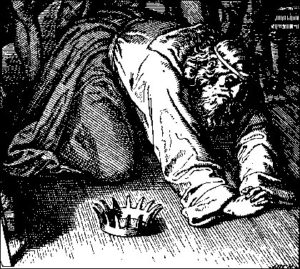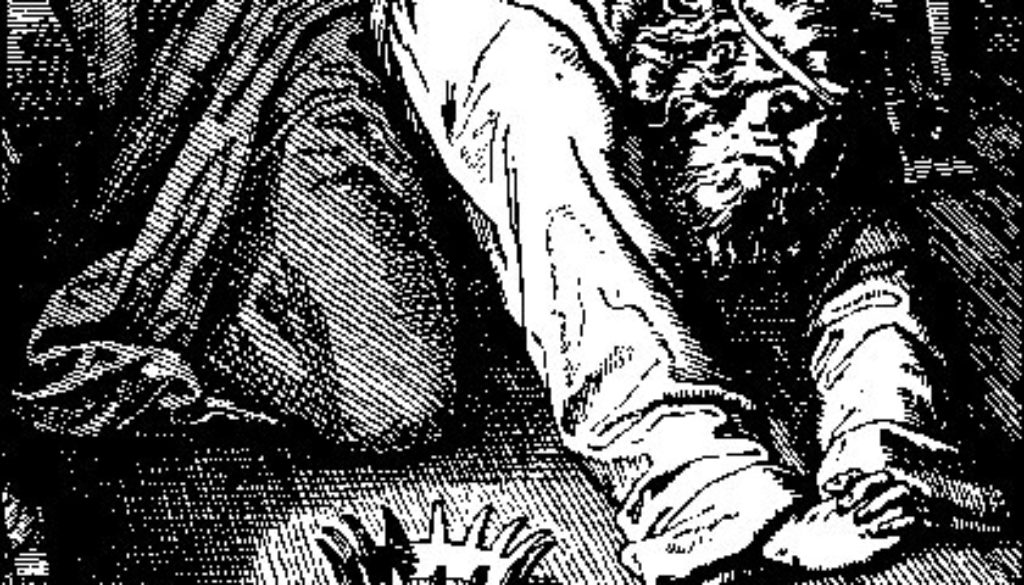2 Samuel 12:16-23 Consequences

David’s sins have been uncovered. From his own mouth he states he deserves death but God doesn’t impose that sentence on him. Instead the child bears it in his place.
Sin demands payment. Every sin has consequences and the full measure of payment is death. David’s sin was no different. Payment was required, especially for the life he had taken. God would not let him escape unscathed.
I wonder why God didn’t simply take the child in his sleep like with Sudden Infant Death Syndrome. The baby forgets to breathe and dies quietly in his bed. Instead David’s child suffered for a week before death. After thinking about it, I have come to the conclusion that the baby’s suffering was what drove David deeper to his knees. He saw firsthand the cost of his sin. It was ugly and agonizing. And someone else was paying the price for it.
As a mother I would have been crying out for God to take me instead. I wonder if part of David’s time on his face was spent doing the same. Let’s jump into our story and see where it takes us.
♥ ♦ ♥
David is on his face in his chambers. Nathan left after pronouncing a death sentence for the child Bathsheba just bore him. Abket’s feet resound on the wooden floors as he rushes to David’s chambers.
“My lord, something is wrong!”
David jerks his head up at the words and looks at Abket. “The child?”
Abket is surprised by David’s words. Did someone already tell him? Impossible, as he just learned of this issue himself from Bathsheba. “Yes my lord. My mistress summoned me immediately when the child started having difficulty.”
David rises and begins to make his way from his chambers to the nursery. “What is wrong with the child” he asks Abket as they walk together.
“He is thrashing about then going as still as death. Only his breathing betrays the fact that he still lives.”
They reach the nursery and Bathsheba quickly. She holds the infant in her arms and sobs over him.
She pleads with David. “Do something” she cries.
David takes the child from her arms and looks into his still face. As he is holding him he begins to convulse again almost throwing himself from David’s hands. David quickly clutched him to his chest to prevent dropping him. The child’s arms and legs beat against David’s body as if struggling to free himself. This continues for what feels like an eternity. When he stills David loosens his hold and gazes into his face. It is blue tinged but begins to regain some color now that he is still. The small rise and fall of the baby’s chest and the return of color are the only indications that the child is still alive. His body is as a rag doll’s; limp with arms, legs and head connected by stitching alone.
“Send for the priest” commands David in a voice barely above a whisper. He does not want to disturb what little rest his baby seems to be receiving.
“How long has he been doing this” David asks Bathsheba.
“He was screwing up his face as if something sour was in his mouth an hour or so ago but I passed it off as dreaming. I sent for Abket the moment he began this” she points to the child’s stilled form. “He ran directly to you.”
“How many times has he done this?”
“This is the second time.”
David is anxious for the priest to arrive. The priests are the physicians as well. David hopes he can help the child. But deep within he knows there is only one source of help and that Source has already spoken on the issue.
The priest arrives with a bag full of tonics. Abket had told him of the baby’s condition so he came prepared. He is brought directly to the nursery. And he asks the very same questions David did and receives the same answers.
Opening his bag he produces a small mirror and holds it very near the baby’s nose and mouth. It fogs, indicating the baby is breathing. He also puts his ear to the child’s chest and hears his heart beating. He assesses the baby’s temperature and finds him slightly warm. He pulls his eyelids back and finds his eyes in a normal position. Finally he pinches the baby to see his response to pain. The baby barely stirs.
“I have a tonic to relax him when he is in the throws of the fit but he is past that right now. The best thing for him at this point is to let him sleep. We could also try using cooling towels on him as he is a bit warm. Don’t cool him too much though.” He reaches in his bag and pulls out a vile and presses it into Bathsheba’s hands. “When he begins to thrash, dip your finger in this and run it on the inside of his cheek. It will stop the seizing.”
Bathsheba is grateful for the help. She carefully lays the vile beside the baby’s cradle so it will be within reach at all times. Before leaving the priest anoints the baby with oil and prays a blessing over him. “Send for me if he worsens.” With these final words he departs.
David’s heart is screaming within him. HE knows the reason for his son’s distress; David’s own sin. He also can’t help but hear Nathan’s words echoing in his mind; “The child who is born to you shall die” (verse 14b).
David knew the only hope his child had would come from the hand of the Lord. Maybe He would show mercy to the babe. David would spend himself in prayer for his son. David lay face down on the floor in the nursery praying to the Lord all that day. He heard every time Bathsheba ministered to the baby as he was seized by another fit. He herd as she walked the floor in worry. Every time Bathsheba gasped in fear David prayed a little harder.
The tonic seemed to be helping as the fits were not lasting as long. But they were still coming far too often for comfort. The priest returned as night fell. He wanted to assess the baby again. After a thorough examination the baby seemed no worse but also no better. “It is possible he will shake this in the night. He is still a little warm. The night breeze should help cool him. Be certain his window is open.”
Bathsheba, worn out from tending to her son all day tasked his nurse with the job of moving his cradle under the window for better air flow. She laid her son down in his bed again and waited.
Several times in the night the baby required the tonic to stop the fits. The night breeze did nothing to cool his body or bring him rest. David remained where he lay in the nursery pouring his heart out to the Lord.
Morning brought with it the priest. He was expecting to see some improvement when he first entered but his face fell when he put his ear to the baby’s back. There were sounds of wheezing when he breathed. Bathsheba saw his face and knew something else was wrong. “Tell me” she demanded.
“The baby’s breathing sounds are different than the last time. It may just be a cold setting in. The night air doesn’t seem to have helped. We need to try steam instead. Boil water and put it in a pot next to his bed. Cover both him and the pot with a tent. It will help him breathe easier.”
With all the commotion in the nursery David finds himself in the way. His son’s worsening condition also calls for more fervent prayer. David goes to his favorite spot in the garden. This is where he feels closest to the Lord, outside of the tent for the Ark. He lies facedown again and continues to pray. “O Lord, my soul cries out to you. I am worn out and undone. My child was born in sin but is innocent of these acts. They are mine to bear, not his. Please have mercy on him and let him live. Lay this sin at my door, not his. Take my life if You must but spare his.”
Abket finds David in his garden spot. “My lord, you have eaten nothing since the child fell ill. You must eat to keep up your strength.”
“No. See to his mother. I must remain before the Lord. Leave me!”
Abket bows and goes to check on Bathsheba. She too has been consumed with the child’s needs. “Mistress, have you eaten? You must keep your strength to care for the child. May I bring you something?”
“Thank you Abket. That would be most welcome.”
Abket quickly prepares bread, cheese and figs for Bathsheba. He leaves it for her, along with a jug of water, in the nursery. He ensures there is plenty for all who are tending to the baby. This is a task he can do to help.
The priest returns again in the evening to check on the baby. The fits continue and his breathing is no better. He shakes his head after listening to the baby’s breathing. He also notices that the child is even warmer than before. Bathsheba reports that the tonic is still shortening the fits so he supplies her with another vial. “Keep giving him the tonic but also wash him with cool cloths. We must bring his fever down before it gets too high.”
Bathsheba will try anything! She is desperate to help her child. She sweats under the tent with her son and the boiling water to loosen his breath while washing his body with cool cloths to break his fever. She has never worked more fervently at anything in her entire life.
One day slips into the next and each bring a new treatment to try. Yet all fail to relieve the baby’s suffering. David has not risen from his spot in the garden for more than to relieve himself. His prayers have been constant; pleading with the Lord to spare his son. Many have tried coaxing him to eat but he refuses all attempts. He has only accepted water to replenish the liquid that flow freely from his eyes and to quench his throat from his cries. Even this is taken sparingly.
Bathsheba has not left the nursery except to relieve herself. The baby barely nurses and she has to be ready to snatch her breast away at the first sign of a fit so he will not choke on her milk. Her breasts are swollen and tender as her body yearns to meet her child’s expected needs.
Her heart breaks watching her child suffer. She prays for his deliverance. She doesn’t need David or Nathan to tell her that her child’s pain is a result of her sin. The guilt she feels over his pain weighs on her like a millstone. She prays a prayer she never thought she would; “If You are going to take him, please do so quickly. I cannot stand to see him suffering so.”
By the evening of the sixth day the priest doesn’t even bother to come anymore. He has no more tonics or ideas to try. The child’s fever is unbreakable. His breathing is so labored that Bathsheba has to hold him upright to prevent the weight of his own little chest from crushing in on him. His fits are no longer calmed by the tonic and are so frequent that there is little time for him to rest between them but there is no strength behind the fits any longer. They produce only twitching movements instead of thrashing.
Bathsheba sits with the baby against her holding him upright to breathe. David lies in his same spot in his garden. Both are calling out to their Lord on behalf of their child. Both feel the silence of His answer.
The servants move through the house as silently as possible. The whole house was permeated with a feeling of dread. What would become of the king if the child died? How would his mother recover from such an ordeal? They have given up on trying to coax David to eat. They made certain he always had water but left him in solitude other than that. They concentrated on keeping Bathsheba fed and cared for.
Just before sunrise on the seventh day a mournful cry arose in the nursery. The baby had finally succumbed to death. His struggle was at an end. Bathsheba held him to her chest and wept bitter tears. “Why did he have to suffer so? He was innocent! Could You not have spared him this?”
The servants had rushed to her cry and stood helpless beside her. They had no comfort to offer her. She needed her husband. He would be the one to help her heal but he was so broken by the child’s illness that he may not survive his death.
Abket has kept watch on his master as much as possible without being intrusive during the child’s illness. Bathsheba’s maid finds him waiting near the garden. She quietly tells him of the news. “The child has died. His mother is in need of comfort from her husband.”
Abket, keeping his voice low answers her, “I fear he will be of no comfort to her. ‘While the child was yet alive, we spoke to him, and he did not listen to us. How then can we say to him the child is dead? He may do himself some harm’ (verse 18b).”
David sensed someone in the garden with him. He looked up and saw the servants whispering together. He knew right away what this meant; his son was dead. He raised himself up onto his knees and spoke; “Is the child dead?” (verse 19b).
Abket knew he had to answer truthfully. “He is dead” (verse 19c). He cringed as he spoke the words.
David carefully raised himself to the bench beside him. After a few moments he came to standing and slowly made his way out of the garden. As he passed Abket he ordered; “Draw me a bath.”
Abket was shocked at David’s command but hurried off to fulfill it while David slowly made his way to his chambers. As water was kept constantly boiling for the baby’s breathing, Abket was able to fill David’s bath quickly. David dismissed Abket after the bath was ready. He wanted privacy.
David washed, anointed himself and changed his clothes. He wanted to be clean before the Lord. The payment for his sin had been paid. Now he would go and stand before the Lord.
As soon as he was dressed he made his way to the house of the Lord and worshiped there. “O Lord, You are just and true. You have judged me and found me lacking. The price of my sin will remain stamped on my heart the rest of my life. Thank You for Your forgiveness. Thank You for releasing my son from his pain. Help me to never forget the sacrifice he paid on my behalf. Restore me O Lord. I am undone without You.”
After his offering of worship to the Lord, David returns to his home. He is strengthened by his time in the Lord’s presence. His steps are no longer slow and labored but sure and steady. When he reaches his home he calls Abket. “I hunger. Bring me something to eat.”
Abket bows and hurries to the kitchen to prepare a meal for David. He has eaten nothing in seven days. His stomach may have trouble holding much. Abket chooses bread, cheese and fruit for his king. He also supplies water and a little wine. These he brings to David at his table.
David begins eating as soon as the platter is placed before him. He doesn’t eat as a ravenous man but neither is he slow in consuming this much needed meal.
Several of the servants had followed Abket as he brought David his meal. One of the stewards steps forward with an indignant look on his face. “What is this thing that you have done? You fasted and wept for the child while he was alive; but when the child died, you arose and ate food” (verse 21b).
David locked eyes with him. “While the child was still alive, I fasted and wept, for I said, ‘Who knows whether the Lord will be gracious to me, that the child may live?’ But now he is dead. Why should I fast? Can I bring him back again? I shall go to him, but he will not return to me” (verses 22-23).
The servants face burned with shame for challenging his lord. But in his heart he still held that a time of mourning would have been appropriate.
(to be continued)
♥ ♦ ♥
Father God, my heart breaks for the baby. I know he suffered because of the length of time it took for him to die. I would have been crying out for an end to his pain, one way or another. I realize his suffering could have been drawn out longer but I’m certain David and Bathsheba both were sufficiently punished with the length. Thank You for relieving the baby’s pain.
Seeing the pain inflicted by my sins on another is more painful than suffering that pain myself. I remember the day my frustration left me undone and my child scarred emotionally. I PRAY he doesn’t remember the events of that day! Knowing that I had hurt his heart nearly broke mine. I cannot imagine knowing my sin caused the death of my child. I would have probably done as David’s servants feared he would.
My sin caused Jesus suffering. My heart breaks again each time I sit with that knowledge. I drove the nails that held Him on the cross. What I wouldn’t give to have spared Him that pain.
Thank You Jesus for willingly enduring the cross. The nails didn’t hold You; love did. A love so strong I may never fully understand. Hold me Jesus as I soak up that love! I need to feel it after the pain of today’s story.




